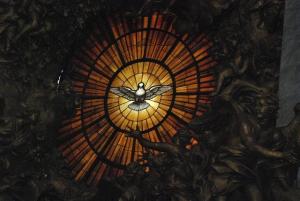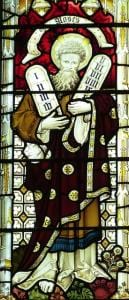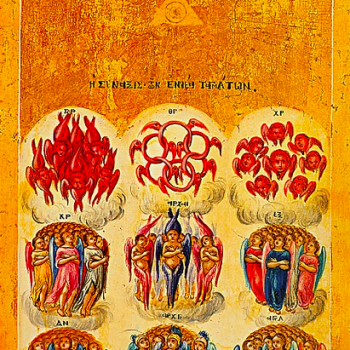The Symbol of the Faith
Catholic Christianity claims to be a lot of things: a family, a mystery, a school, a dynasty, a way of life. One of the things it claims to be is a coherent system of belief. This system is defined by certain philosophical and historical claims about God, the universe, and humanity. Those claims are summarized in an old confession of faith, derived from the baptismal liturgy used in Rome in the early centuries of the Church; we know this confession as the Apostles’ Creed.
I believe in God, the Father almighty,
Maker of heaven and earth.
And in his only Son, Jesus Christ our Lord,
Who was conceived by the Holy Ghost, born of the Virgin Mary,
Suffered under Pontius Pilate, was crucified, died, and was buried;
He descended into hell; on the third day, he rose again from the dead;
He ascended into heaven, and sitteth on the right hand of God the Father almighty;
From thence he shall come to judge the quick and the dead.
I believe in the Holy Ghost;
The holy Catholic Church, the communion of saints;
The forgiveness of sins;
The resurrection of the body, and the life everlasting.
Amen.

This used to be called “the symbol of the faith,” although not really in the modern sense of “symbol.” The Greek σύμβολον (symbolon), from a verb meaning “to put together,” meant a specific method used in the ancient world to confirm that a message was genuine. A person would break a piece of pottery or the like, resulting in two halves that fit perfectly together, and give one half to a person they would later be sending a message to; when the message was actually sent, the messenger would receive the other half, so that they could prove they were truly acting on the original sender’s behalf. Primitive Christians referred to the creed as their symbol, because it proved they really were baptized members of the Church and not state snitches or religious dilettantes.
The Blueprint
This creed is still a convenient symbol and summary of the faith today. The Church has filled out some of its terms and phrases in later councils and definitions, especially the Seven Great Councils of late antiquity, but the Apostles’ Creed is as good a place to start as any in going through the Catholic faith step by step.
Its structure is obviously Trinitarian. We start with God the Father and with creation, as the Bible itself does. We then proceed to the person and work of Christ, which, naturally, involves the most distinctively Christian content; it’s here that we get the historical claims the faith relies upon. Thirdly, we profess the Holy Ghost and his works, which he chiefly effects through the Church. In order to articulate all of this stuff, I’m going to need to spend some time on “detours” that were not necessary when this brief creed was composed. Accordingly, my material probably won’t correspond perfectly to its clauses, but they still form a serviceable framework.
Postulates

However. To embark on a philosophical journey like this at all—at least if you’re coming at it like I do—there are a couple of postulates you have to accept at the outset. The reason for this is not so much that otherwise you might not draw Catholic conclusions, but that without these postulates, you can’t realistically draw any conclusions.
First, we have to consider the human mind capable of discovering some amount of truth. Some general (if imperfect!) validity must be allowed to the senses, and some basic (if limited!) reliability must be allowed to rational analysis—logic, the scientific method, etc. If someone thinks the human mind is so unreliable that philosophy as such is just a lot of mental wanking, I won’t argue with them; what would be the point? It doesn’t sound like they’d find this sort of thing interesting. And even if they did, we’d certainly be approaching the discussion at cross-purposes: to them, I suppose it would be a form of entertainment or something, while I am trying to use it as a tool, and those aims don’t usually mix well.
There are a few “footnotes” to this postulate; for instance, in saying that the human mind is basically reliable, we’re not binding ourselves to the conclusion that we never get things wrong at first glance, or that we have access to all the relevant facts in every case, or that the truth can never be paradoxical. However, we are binding ourselves to the idea that any chain of reasoning which ends in self-contradiction—including “proofs” that the human mind is incapable of discovering any truth—must be false. That may sound painfully obvious, and therefore not that important; but I’ve been surprised (and unsettled) by the number of people who are quite happy to accept systems that they know very well involve these unsustainable ideas.

My second postulate is that a broad, basic moral consensus has to be allowed to the human race. I’m not talking about its origins, nor about its details (e.g., whether the ancient Roman or primitive Islamic norms of marriage were closer to the ideal). I’m saying only that certain rules of conduct—things like avoiding injury to others, respect for elders, telling the truth, showing gratitude for acts of kindness, and so forth—are recognized by humanity at large as desirable and important. Without this postulate, it’s not really clearly what if anything we mean by “good” in a moral sense, and calling God or atheism or anything else “good” becomes meaningless.
Okay? Okay. Let’s begin.












